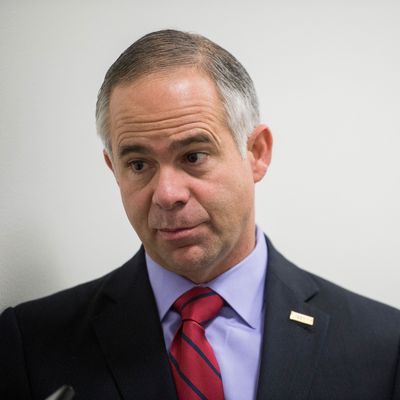
The defeat of House Freedom Caucus firebrand Representative Tim Huelskamp in a Kansas GOP primary is being generally treated as a national political story about (as Molly Ball framed it) the revenge of the Republican Establishment over one of its tea-party tormentors. And it is true that national groups like the U.S. Chamber of Commerce and the Ricketts family super-pac fought a proxy war with Huelskamp’s allies in the Club for Growth and Koch-funded Americans for Prosperity in Kansas’s 1st congressional district.
But in a very real sense what Huelskamp’s defeat showed is that ideology does not always trump local factors, even in the ideological hothouse of the contemporary Republican Party. The endorsement that really lifted the challenger Roger Marshall to victory was probably one from the Kansas Farm Bureau.
Huelskamp’s district, which covers most of western Kansas, is dominated by farm and ranch interests; it famously has more cattle than people, and grows wheat, sorghum, sunflowers, and hay. So it mattered a great deal when Huelskamp, then a House freshman, was kicked off the Agriculture Committee for serial defiance of the GOP leadership. Even more eyebrows were raised when Huelskamp became one of just 12 House GOPers to vote against the last omnibus farm bill in 2013, partially because of its SNAP (food stamp) spending levels, but also because the whole bill included a lot of “corporate welfare.” The revolt against the farm bill by House tea-partyers struck at the very heart of the ancient urban-rural compact that supported agricultural programs deemed essential to places like the 1st congressional district of Kansas. In retrospect, it’s rather amazing Huelskamp survived as long as he did.
But there was another primarily local factor that contributed to Huelskamp’s demise: a backlash from Republican voters against the ideologues closely associated with Governor Sam Brownback, whose tax-cutting “experiment” in Kansas produced a fiscal disaster and a particular crisis in public education. In yesterday’s GOP primary, pro-Brownback state legislators lost ten of 16 contested seats; the Wichita Eagle called it a “brutal night for conservatives.” Reality matters, and if Tip O’Neill overstated things by saying “All politics is local,” it’s clear local issues do matter when they are in sharp conflict with ideology.
In many respects, the overriding story in Republican politics for a very long time has been the conquest of the party by conservatives who imposed a rigid ideology on themselves and others not just in the right-wing fever swamps of the Deep South or the Mountain West, but across the country. What’s happening in Kansas right now doesn’t indicate conservatives are losing their grip on the GOP; a stronger data point for that proposition would obviously be Donald Trump’s hostile takeover of the national ticket. But Kansas is showing there are limits to the power of ideology.






























